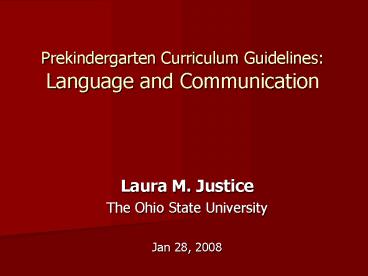Prekindergarten Curriculum Guidelines: Language and Communication - PowerPoint PPT Presentation
1 / 34
Title:
Prekindergarten Curriculum Guidelines: Language and Communication
Description:
Engage in periods of sustained joint attention. Listen to ... Ask questions about things with intonation and some interrogatives (what) By 4 years, children... – PowerPoint PPT presentation
Number of Views:36
Avg rating:3.0/5.0
Title: Prekindergarten Curriculum Guidelines: Language and Communication
1
Prekindergarten Curriculum Guidelines Language
and Communication
- Laura M. Justice
- The Ohio State University
- Jan 28, 2008
2
- At about 1 year, children
- Say their first word
- Comprehend several words
- Point to objects
- Engage in periods of sustained joint attention
- Listen to storybooks read by a caregiver
- Use a range of strategies to get their needs met
3
- By 2 years, children
- Use 100s of words and comprehend many more
- Acquire a new word with only several exposures
- Speak in three word sentences
- Add affixes to words to inflect meaning
- Ask questions about things with intonation and
some interrogatives (what)
4
- By 4 years, children
- Use and understand 1000s of words
- Use complex and compound sentences
- Produce noun, verb, adverbial, adjective, and
prepositional phrases - Use language to predict, reason, imagine,
hypothesize - Insert themselves into ongoing conversations
- Read some simple words in storybooks or
surroundings - Write messages to others using developmental
spelling
5
Multi-Dimensionality of Language
6
Child Emergent Writing
7
- From birth to five years
- Development of language is steep and fast
- Childrens MAJOR developmental task is learning
language - The opportunities of early childhood come once in
a lifetime
Expressive vocabulary (English) of Eastern
European adoptees Glennen Masters (2002)
8
When Language Develops Slowly
- Primary schools and neurobiology are not equipped
to help children catch up when they have late
starts in language acquisition
9
Synaptogenesis, Neural Plasticity, and Experience
Center on the Developing Child (2007)
10
Focus of Instruction
TRANSITION
TRANSITION
Emergent Literacy Meaning Precursors Code
Precursors
Early LiteracyLearning to Read Decoding
Conventional Literacy Reading to
Learn Comprehension
Reading Development
11
Type of Intervention
Primary Prevention
Secondary Prevention
Tertiary Prevention
Emergent Literacy Meaning Precursors Code
Precursors
Early LiteracyLearning to Read Decoding
Conventional Literacy Reading to
Learn Comprehension
Reading Development
12
Stimulating Language from a Social
Interactionist Perspective
- Frequent
- Well-tuned
- Varied
- Input
It is very very hard to manualize this!!
13
Language Development
- Childrens language skills MOVE over the year
- They CHANGE and GROW to look like the INPUT they
receive
14
Language Skills Mature/Adult
Child Skills
Child Skills
Child Skills
Child Skills
15
Well-Tuned?
Stimulates Language
Does Not Stimulate Language
Child Language Ability
16
How do these develop?
Relationship between preschool teachers complex
syntax use and childrens Syntactic
comprehension. From Huttonlocher, J., Vasilyeva,
M., Cymerman, E., Levine, S. (2002).
17
A Day in PreKLANGUAGE MODELING (135
CLASSROOMS)(Justice, Mashburn, Hamre, Pianta,
2008)
18
A Day in PreKWhat does teacher talk look
like?(Pence, Justice, Wiggins, in press)
19
A Day in PreKWhat do teacher utterances look
like?
20
Teacher Use of Language Stimulating Techniques,
Child Attendance, and Child Language Growth
Justice, Mashburn, Pence, Wiggins, in press
21
A Formidable Challenge
- Scaling up practices that represent the cutting
edge of neuroscience, developmental-behavioral
research, and program evaluation - In the absence of quality prekindergarten
programs and ambitious developmental goals,
disparities among children will only grow larger
over time - Center on the Developing Child (2007)
22
Guidelines Influence Practices
23
RECOMMENDED DAILY ALLOWANCES PREKINDERGARTEN
LANGUAGE SUCCESS
Hugs, Smiles, and Praise Used Often!
Sentences and Structure 8 Servings
Listening Comprehension 3 Servings
Colorless green ideas sleep furiously
Vocabulary 6 Servings
Speaking 6 Servings
Speech Production 3 Servings
24
RDAs for Prekindergarten
- Listening Comprehension
- Vocabulary
- Sentences and Structure
- Speaking (Conversation)
- Speech Production
25
Two Dimensional Matrix of Language
DOMAIN
Tomblin, Records, Zhang, 1996
26
A Comment on Strategies
- We tend to focus on Targets and Materials
- forgetting about the role of the teacher!
- Recent curriculum studies indicate that targets
alone are insufficient for achieving improved
child outcomes
27
Changing DevelopmentQuality Teaching Principles
- Targets
- Strategies
- (Materials)
28
Changing DevelopmentVocabulary
- Target/Guideline
- Child demonstrates understanding or knowing the
meaning of 3,000 to 4,000 words, many more than
he or she uses - (TX proposed prekindergarten guidelines, 2008)
29
Development of Word Knowledge(Curtis, 1987)
- Stage 1
- I never saw it before
- Stage 2
- Ive heard of it, but dont know what it means
- Stage 3
- I recognize it in context, it has something to do
with - Stage 4
- I know it!
30
Changing DevelopmentVocabulary
- Strategy
- Use and explain new words daily when speaking
with children - Discuss new word meanings before, during, after
book reading - Create opportunities for children to experience
new words in multiple ways across multiple
experiences - (TX proposed prekindergarten guidelines, 2008)
31
Elaborating Words during Storybook Reading
- Children in high-poverty schools completed 20
small-group storybook reading sessions - Word learning studied for words elaborated
compared to words not elaborated - Example book The Caterpillar That Roared
- Elaborated Words gaze, ripples, surface
- Non-Elaborated Words horrified, snuggled, twitch
Justice, Meier, Walpole, 2004
32
Elaborating Words during Storybook Reading
Gains for children with very low vocabulary
scores Justice et al., 2004
33
An Evidence-Based Mindset
- Teachers pressed to utilize strategies and
curricula that are empirically validated - Evidence-based practice requires educators to
consider findings from empirical research - Incorporation of specific research-based
strategies enables teachers to engage in
evidence-based practice and actualize these
targets - Professional development will be critical
34
Thank You
- Laura Justice
- Professor
- College of Education and Human Ecology
- The Ohio State University
- Justice.57_at_osu.edu

